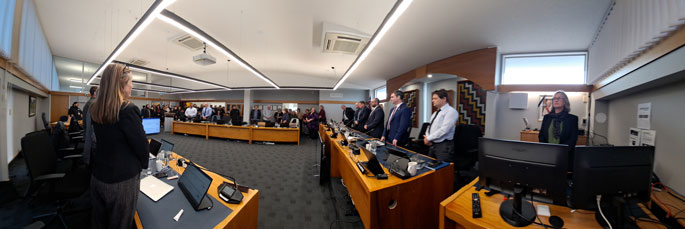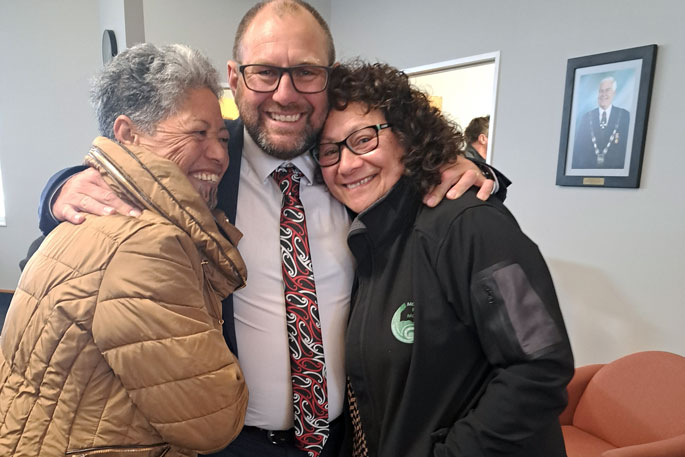A historic vote in the Hauraki District Council Chambers this week passed a resolution to include Māori Wards in the review of Council’s make up for the 2025 and 2028 triennial elections.
For Mayor Toby Adams, Councillors and the huge turnout representing local iwi, Kaumātua, rangatahi and tamariki– it was a moment to commemorate and absorb on Wednesday.
"There’s obligation by law, then there’s a feeling for what’s right. This coming together to kōrero and embrace change – it brought many to tears of joy today as the enormity of the decision sunk in," says Mayor Toby.
"Safeguarding Māori cultural concepts, values and practices and viewing our decisions through a Māori world view lens has already been enriching the way we approach our responsibilities at Council.
"Now we have the opportunity to work as one to represent the views and aspirations of whānau, hapū and Iwi across all aspects of council business."
Speakers on behalf of local iwi encouraged Council to go forward, not in fear of change or diversity but in strength.
"We’re here to work together, come together as one and work with you, not against you," says John Linstead of Ngāti Hako.
Josie Anderson, of Ngāti Hako, echoed Waihī Ward Councillor Sarah Holmes’ sentiment of "it’s a no brainer, we’re either closing the door or opening it".
Josie says that this is the foundation to look to the next 100 years and a decision so important, they brought their tamariki, their mokopuna and their rangatahi with them to witness it.
"This will take our rangatahi and our people into the future. Don’t be frightened by it. We all have different opinions but this is just another step to keep us looking for effective contributions into the infrastructure of council."
Māori Ward(s) sit alongside general wards in a district.
Like in a national election, they allow voters on the Māori roll to elect a representative to their local council.
People on the Māori roll will be able to vote for the Mayor and candidates for Hauraki who stand in the Māori Ward(s) but not in the general Wards.
How many Māori wards Hauraki District will have, is decided by a formula in the Local Electoral Act 2001 (Schedule 1A-2) based on the ratio of Māori electoral population to the total electoral population.
Based on that formula, it’s likely there may be two Māori wards in Hauraki District (or two members within one district ward, depending on the representation review).
The next step for Council is to conduct a representation review which would decide how many wards there would be, their boundaries and how many councillors in each.
Local Government, including Hauraki District Council, is legally obliged to provide an environment (through systems structures and services) that encourages and supports Māori to enter and participate in local governance processes.
 A packed Council Chamber stands to acknowledge the historic decision.
A packed Council Chamber stands to acknowledge the historic decision.
Council’s representation arrangements were last reviewed in 2018 which took effect for the 2019 and 2022 triennial elections.
"Back then, we didn’t feel we had enough time with iwi to do justice to the decision to include Māori Wards. This year we committed to the mahi through various huis and the passionate input from iwi.
"Today, we voted on the overwhelming support iwi showed for having Māori Wards in the rohe. Next comes the review of what the breakdown of wards will look like before our next local government election in October 2025. But for today, it’s about recognising how important this decision is for our iwi – I couldn’t be prouder."



1 comment
It would be hard...
Posted on 30-10-2023 14:24 | By morepork
... for a reasonable person to object to this, given the very positve attitude expressed by the iwi, and the fact that members will be ELECTED and not appointed. Good to see people talking together and moving forward together. The fact that iwi could avail itself of the existing mechanism, like everybody else, is not lost, but the people in the area want this form of "culturally comfortable" representation and if it helps progress in the area without special advantage to any group, then it has to be a "good thing". Congrats to all concerned.
Leave a Comment
You must be logged in to make a comment.